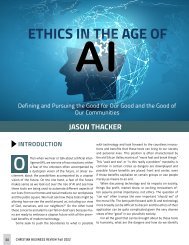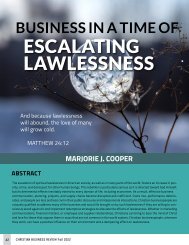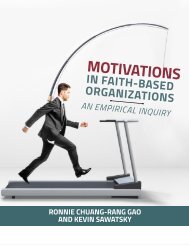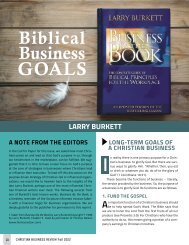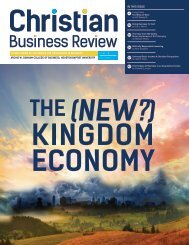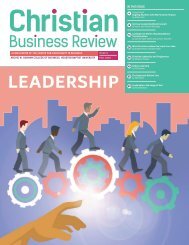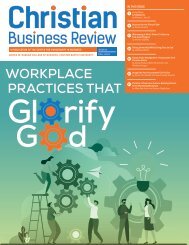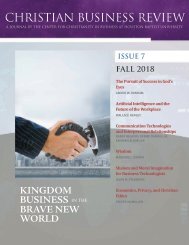Christian Business Review 2022: Pressing On Toward God's Goal
Create successful ePaper yourself
Turn your PDF publications into a flip-book with our unique Google optimized e-Paper software.
MOTIVATIONS IN FAITH-BASED ORGANIZATIONS<br />
CBR PEER-REVIEWED ARTICLES<br />
(a correlation analysis confirmed that the two variables are<br />
indeed correlated; r = .14, p = .039); however, when motivation<br />
is inserted, the significant relationship disappears. The<br />
full mediation indicates that when employees in FBOs perceive<br />
a higher level of fit between their faith and that of the<br />
organization, they will be more motivated, leading to higher<br />
job satisfaction. Furthermore, as analyzed, perceived fit is a<br />
condition for personal faith to have an effect on job satisfaction.<br />
<strong>On</strong>ly when employees with strong religious beliefs and<br />
practices believe that their faith matches that of their organization<br />
are they likely to be more satisfied with their jobs.<br />
As hypothesized, transformational leadership is positively<br />
related to job satisfaction in FBOs, and this link is mediated<br />
by motivation. This finding indicates that the transformational<br />
leadership practices that are effective in secular<br />
organizations, such as being charismatic, articulating a vision,<br />
soliciting creative ideas, and taking individual care of each<br />
follower, 2 are also effective in motivating employees in FBOs.<br />
In other words, whether working for God or not, these transformational<br />
leadership practices are effective. Furthermore,<br />
the higher path coefficient from transformational leadership<br />
to motivation (β = .45, p < .001) than that from perceived fit<br />
to motivation (β = .20, p = .003) indicates that transformational<br />
leadership may be even more effective than perceived<br />
fit in motivating employees in FBOs. Furthermore, the finding<br />
that transformational leadership has both a direct effect<br />
on job satisfaction and an indirect effect through motivation<br />
indicates that transformational leadership practices will motivate<br />
employees, which in turn will lead to job satisfaction,<br />
and that motivation only partially mediates transformational<br />
leadership’s effect on job satisfaction. That is, in addition to<br />
motivation, there should be other mediators in the link between<br />
transformational leadership and job satisfaction in<br />
FBOs. These transformational leadership related findings are<br />
particularly inspiring because they indicate the necessity to<br />
explore the possible effects of other management practices<br />
and leadership styles in faith-based work environments.<br />
Other practices effective in secular organizations may be<br />
just as effective in FBOs. Exploring such endeavors would<br />
advance the literature on both leadership and FBOs. Finally,<br />
we find that neither role nor years in the organization have<br />
an effect on job satisfaction. These findings suggest there<br />
may be limited need to differentiate between roles when developing<br />
motivational strategies in FBOs, and longer service<br />
does not necessarily lead to higher job satisfaction.<br />
THEORETICAL<br />
CONTRIBUTIONS<br />
This research makes five theoretical contributions. First,<br />
we advance the transformational leadership literature<br />
by empirically confirming that transformational leadership is<br />
effective in FBOs. Specifically, we confirm that transformational<br />
leadership leads to more motivated employees, which<br />
in turn results in higher job satisfaction. Given that employees<br />
in FBOs put God ahead of a human leader we questioned<br />
if this would reduce transformational leadership’s effectiveness.<br />
However, our results indicate that transformational<br />
leadership was effective in FBOs. Furthermore, the partial<br />
mediation of motivation found in our research indicates that<br />
the mediating mechanism in the link between transformational<br />
leadership and job satisfaction in FBOs is complex;<br />
other variables have a mediating effect in this relationship<br />
as well.<br />
Second, we advance the motivation literature by empirically<br />
confirming that expectancy theory is applicable in faithbased<br />
work environments. Our results show that both transformational<br />
leadership and perceived fit have positive effects<br />
on motivation and that motivation positively affects job satisfaction<br />
(β = .25, p < .001). Specifically, both transformational<br />
leadership practices and perceived fit will lead to employees’<br />
stronger beliefs that they are able to complete assigned<br />
tasks (expectancy), that managers will honor the reward policies<br />
(instrumentality), and that they value the rewards given<br />
to them (valence). These factors will make employees more<br />
satisfied with their jobs. Given that rewards and compensation<br />
included both non-financial (e.g., recognition, promotion)<br />
and financial (e.g., pay increase, commissions) incentives, the<br />
findings further indicate that even if employees in FBOs have<br />
the religious belief that they should not focus on personal<br />
gain, financial incentives are still effective motivators leading<br />
to job satisfaction. A possible explanation for this seeming<br />
contradiction is that employees may view the rewards<br />
as God’s recognition for their work. We did not examine this<br />
speculation in the study, but leave it to future research to<br />
explore empirically.<br />
Third, we introduce the construct of perceived fit between<br />
personal faith and organizational faith and find that it positively<br />
affects motivation and job satisfaction and moderates<br />
the relationship between personal faith and job satisfaction<br />
(that is, personal faith affects job satisfaction only among<br />
employees high on perceived fit, but not among employees<br />
CHRISTIAN BUSINESS REVIEW Fall <strong>2022</strong> 372




